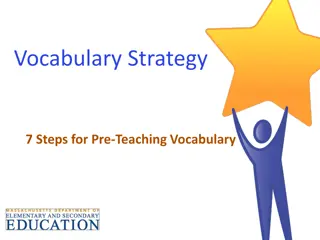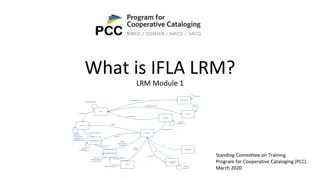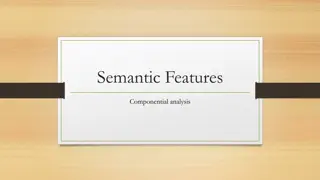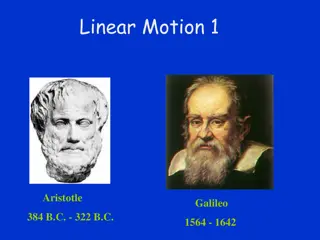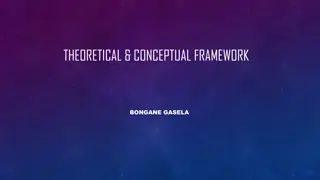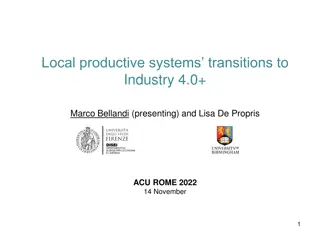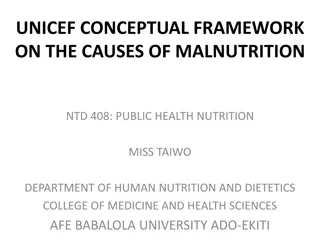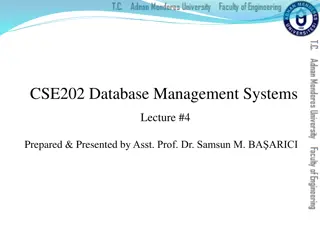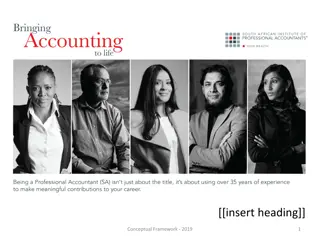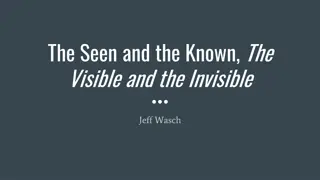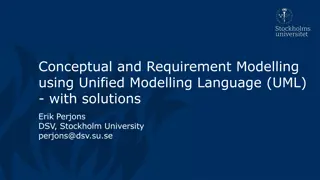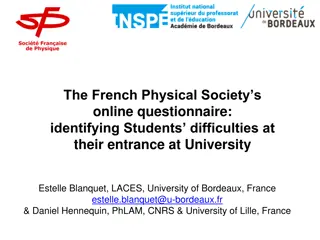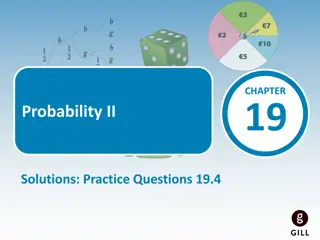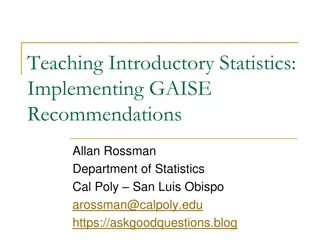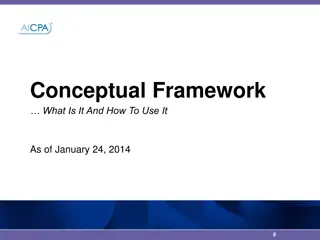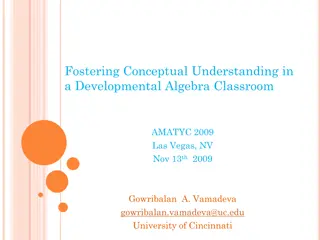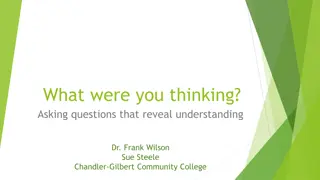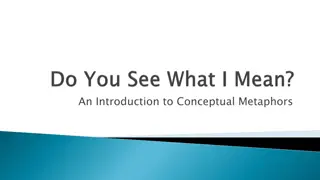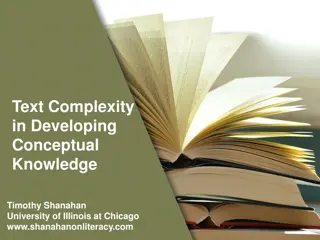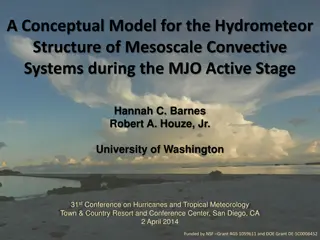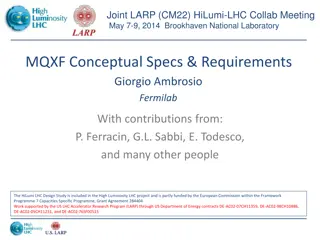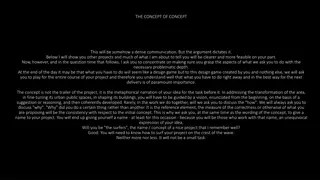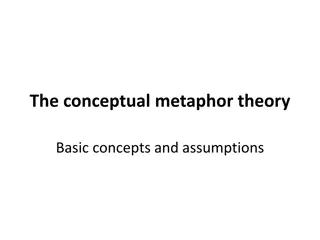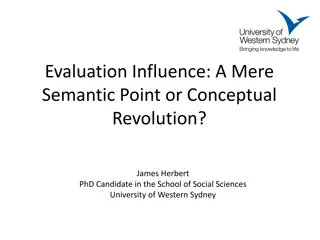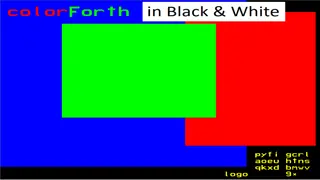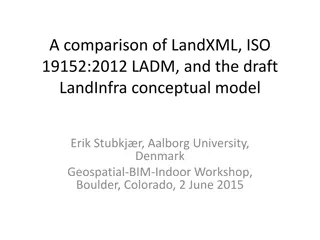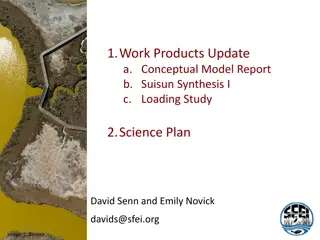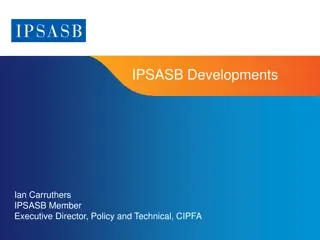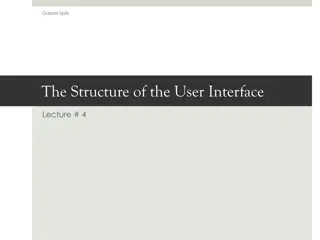Conceptual Framework for Healthcare Innovation in Rural Areas
Explore a conceptual framework integrating home care and mobile health services for poverty alleviation and rural development in African regions. Addressing critical health challenges, this research aims to bridge healthcare disparities and promote rural development, focusing on innovative approache
9 views • 18 slides
Overview of Research Process and Quantitative Research Phases
The research process involves steps like identifying, locating, assessing, and analyzing the research question to find answers. It includes quantitative and qualitative approaches, with specific phases like conceptual, design, empirical, analytic, and disseminating phases in quantitative research. E
9 views • 27 slides
Effective Pre-Teaching Vocabulary Strategies for ELs
ELs benefit from specific pre-teaching vocabulary strategies such as selecting important words, providing contextual understanding, offering student-friendly definitions, and engaging in oral interactions. Massachusetts Department of Elementary and Secondary Education emphasizes the importance of ch
1 views • 7 slides
Localisation in Child Protection Coordination: A Conceptual Framework
This presentation explores the preliminary conceptual framework and approach for localisation in child protection coordination. It delves into the roles of local actors, coordination systems, governance, decision-making, partnerships, and funding in promoting localisation efforts. The importance of
0 views • 22 slides
Understanding IFLA LRM: A Conceptual Reference Model
IFLA LRM, created by the International Federation of Library Associations and Institutions, consolidates FRBR, FRAD, and FRSAD models into a coherent framework. It aims to structure bibliographic data logically and inclusively, focusing on end-user needs and tasks. The model describes interrelated e
0 views • 11 slides
Understanding Semantic Features in Language Study
Studying basic conceptual meaning is crucial in language analysis to explain the oddness in sentences like "The hamburger ate the boy." Semantic roles and thematic roles help identify the roles of entities in a sentence, such as agents and themes. By analyzing the components of conceptual meaning, w
1 views • 12 slides
Understanding Linear Motion in Physics
Explore the concepts of linear motion in physics through the teachings of Aristotle and Galileo. Learn about scalars and vectors, distance versus displacement, examples of displacement calculations, and speed versus velocity distinctions. Engage in conceptual tests to deepen your understanding of th
0 views • 27 slides
Enhancing Learning Through Classroom Discussions
Classroom discussions play a vital role in improving students' conceptual understanding, communication skills, and thinking processes. By engaging students in active discourse, teachers can foster an environment that encourages critical thinking, idea expression, and effective communication. The fiv
1 views • 19 slides
Understanding Historical Research: Methods, Purposes, and Aims
Historical research involves investigating past events systematically to provide a dynamic explanation, interpretation, and understanding of the past. It aims to uncover unknown aspects, answer unexplored questions, and link past happenings to the present to enrich human culture and encourage interd
0 views • 20 slides
Understanding Theoretical and Conceptual Frameworks in Research
The theoretical and conceptual frameworks in research play vital roles by grounding studies in theoretical constructs, enhancing rigor and empiricism, and guiding the research process. The theoretical framework provides a blueprint based on existing theories, guiding researchers in developing their
0 views • 12 slides
Local Productive Systems Transitioning to Industry 4.0+: A Conceptual Framework
A conceptual framework explores factors influencing local productive systems (LPSs) transitioning to Industry 4.0+, emphasizing sustainability models vs. technocratic approaches. It delves into challenges of digital, social, and green transitions, advocating for innovation systems and cross-domain p
0 views • 19 slides
UNICEF Conceptual Framework on the Causes of Malnutrition
The UNICEF conceptual framework on the causes of malnutrition outlines the multidimensional factors contributing to malnutrition, categorized into immediate, underlying, and basic causes. Immediate causes include inadequate dietary intake and diseases, while underlying causes involve issues like ina
2 views • 18 slides
High-Level Conceptual Data Modeling in Database Management Systems
Explore the world of high-level conceptual data modeling in database management systems through understanding ER and UML notations, designing entity-relationship models, and translating conceptual designs into practical implementation phases. Learn about data requirements analysis, database schema d
1 views • 79 slides
Understanding Nursing Theory and Science Essentials
Nursing theory plays a crucial role in strengthening the nursing profession by providing a foundation for reasoning, critical thinking, and decision-making. The metaparadigm of nursing encompasses key concepts such as person, environment, health, and nursing philosophy. Different levels of theory, i
0 views • 12 slides
Understanding the Conceptual Framework of Financial Reporting
The Conceptual Framework of Financial Reporting for 2019 outlines key chapters focusing on objectives, qualitative characteristics, financial statements, elements, recognition, measurement, presentation, and capital maintenance. It emphasizes the importance of providing information on stewardship an
1 views • 13 slides
Understanding the Relationship Between Language, Experience, and Knowledge
Exploring the intricate interplay between language, experience, and knowledge, this text delves into the roles of linguistic and nonlinguistic experiences in shaping our understanding and acquisition of knowledge. Various perspectives, including Sellars' Myth of the Given and Bonjour's distinctions
0 views • 9 slides
Understanding Conceptual and Requirement Modelling Using UML
Enterprise and system models play a crucial role in the business world. This collection of images showcases various aspects of conceptual and requirement modelling using Unified Modelling Language (UML). From business process models to human interactions with software systems, these visual represent
1 views • 92 slides
Understanding the National Adaptation Plan (NAP) Process
Explore the conceptual understanding of the NAP process, highlighting its characteristics, importance for countries, and relation to other national processes. Learn about the objectives of NAP, its flexible and integrated nature, and the focus on reducing vulnerability and mainstreaming climate adap
0 views • 13 slides
Understanding Students' Difficulties at University Entrance in France
The French Physical Society conducted an online questionnaire to identify obstacles faced by students entering university in France. The traditional access method through a national exam has a high success rate, but concerns about the students' preparedness persist. Different educational paths post-
0 views • 22 slides
Understanding Probability through Venn Diagrams in Practice Questions
Explore various practice questions related to probability using Venn diagrams. From shading regions to calculating probabilities of events, these questions provide a visual and conceptual understanding of probability theory. Topics include intersections, unions, complements, and more.
0 views • 42 slides
Enhancing Introductory Statistics Instruction with GAISE Recommendations
Explore how to implement the GAISE guidelines for teaching introductory statistics in college, emphasizing statistical thinking, conceptual understanding, real data integration, active learning, technology use, and assessments for student improvement. The goal is to develop students as critical cons
0 views • 26 slides
Understanding Conceptual Objects in Information Architecture
Explore the essence of Conceptual Objects, which transcend physical carriers and exist independently of material substance. Learn how these objects differ from structural parts of material things and their significance in information architecture.
2 views • 9 slides
Understanding the Conceptual Framework in Professional Judgment
Explore the conceptual framework in professional judgment, including identifying threats, evaluating safeguards, and applying revised thinking. A case study presents a scenario to assess ethical considerations. Polling questions test comprehension of how to address significant threats in attest enga
1 views • 7 slides
Developmental Algebra Classroom: Fostering Conceptual Understanding
Explore the journey through developmental algebra classes focusing on fostering conceptual understanding. Delve into topics spanning Elementary Algebra I, II, III, graphing equations, traditional definitions, and more. Discover key concepts like fractions, functions, factorization, and the importanc
1 views • 14 slides
Enhancing Student Understanding in College Algebra Assessments
Dr. Frank Wilson and Sue Steele from Chandler-Gilbert Community College discuss the issue of students memorizing procedures instead of actually understanding concepts in college algebra. They present a case study highlighting the importance of assessing conceptual mastery over procedural knowledge.
0 views • 31 slides
Understanding Conceptual Metaphors in Literary Devices
Explore the world of conceptual metaphors through literary devices, ornamental figures of speech, and individual metaphorical expressions. Delve into abstract and concrete domains, experiential perceptions, and the paths we take in life as depicted through metaphorical language.
1 views • 24 slides
The Influence of Personality on Presidential Leadership Style: A Case Study of Donald J. Trump
This study examines how personality traits influence presidential leadership styles, focusing on a case study of Donald J. Trump, the 45th President of the United States. It explores the conceptual links between Trump's personality profile and models of political leadership. The research includes a
2 views • 24 slides
The Role of Text Complexity in Developing Conceptual Knowledge
Conceptual learning involves organizing new information into mental structures, focusing on big ideas and themes. While text complexity is often seen as a barrier to learning, it is essential for promoting high-level academic learning. Complex ideas require complex text that explains extensive infor
0 views • 74 slides
Conceptual Model for Hydrometeor Structure of Mesoscale Convective Systems during MJO Active Stage
This study presented a conceptual model for characterizing the hydrometeor structure of Mesoscale Convective Systems (MCSs) during the Madden-Julian Oscillation (MJO) active stage. The research focused on the kinematic structure of MCSs and utilized radar data, compositing methodology, and convectiv
1 views • 24 slides
HiLumi-LHC MQXF Conceptual Specifications and Requirements Overview
The HiLumi-LHC project collaborated with various institutions to develop conceptual specifications and requirements for the MQXF, with contributions from experts in the field. The project focused on design study and received funding from the European Commission and the US LHC Accelerator Research Pr
0 views • 11 slides
Exploring the Depth of Conceptual Narratives in Urban Design Projects
Delve into the intricate world of conceptual narratives in urban design where projects are shaped by metaphoric narrations and reasoning. Discover the importance of developing a coherent vision and giving a distinct name to your project to embody your idea effectively. Embrace the challenge of surfa
0 views • 12 slides
Exploring the Conceptual Metaphor Theory: Enhancing Understanding Through Metaphors
Understanding the Conceptual Metaphor Theory involves grasping how metaphors enhance language expression and comprehension. By relating one conceptual domain to another, individuals can extend language usage beyond immediate experiences, allowing for unlimited expression. The theory's strength hinge
0 views • 46 slides
The Impact of Interactive Teaching on Conceptual Development in Physics
Investigating the effectiveness of interactive teaching in promoting conceptual development in physics, focusing on student learning in both conventional and interactive classrooms. Research examines student understanding through qualitative reasoning questions, such as the baseball bat scenario, to
0 views • 62 slides
Understanding Evaluation Influence: A Conceptual Revolution
Exploring the potential impact of influence as a conceptual framework in evaluations, this study delves into the mechanisms of change, the failures in affecting change, and the moral imperative for societal betterment. Various theories and processes related to influence are examined for their impact
0 views • 15 slides
Ground Boundary Impact on Short Tower Turbines: A Conceptual Study
This conceptual study explores the impact of ground boundary on the production of short tower turbines. It investigates whether two turbines with the same rotor diameter but different hub heights can generate the same energy output. The study examines how the ground boundary influences the airflow p
0 views • 8 slides
Bridging the Conceptual Gap: Edsger Dijkstra's Insights
Edsger Dijkstra urged programmers to shorten the conceptual gap between static programs and dynamic processes, emphasizing the importance of clarity in source code for easy understanding and execution. Chuck Moore's colorForth, an attempt at using color to replace punctuation, ultimately faced limit
0 views • 33 slides
Comparison of LandXML, ISO 19152:2012 LADM, and LandInfra Conceptual Model
This comparison explores LandXML, ISO 19152:2012 LADM, and the draft LandInfra conceptual model in the context of land-related models. It discusses the features, uses, and development history of each model, shedding light on their applications in land administration and cadastral survey information.
0 views • 14 slides
Nutrient Conceptual Model Review Summary
Comments and feedback on a Nutrient Conceptual Model report include suggestions to address issues related to eutrophication concepts, nutrient stoichiometry, community composition, and nutrient reduction goals. Recommendations also focus on incorporating flushing/residence time discussions, predicti
0 views • 9 slides
IPSASB Developments and Conceptual Framework Overview
This content provides a comprehensive overview of the IPSASB developments led by Ian Carruthers, Executive Director, Policy and Technical at CIPFA. It covers key areas such as the Conceptual Framework, including the role and authority, objectives and users, quality characteristics, and the reporting
0 views • 18 slides
Understanding User Interface Design Basics
Explore the fundamental aspects of user interface design, including design elements, user interactions, and conceptual models. Learn about the framework needed for driving customer experience, different design aspects, and the concept of an interface. Discover how to create a high-level metaphor, st
0 views • 24 slides


